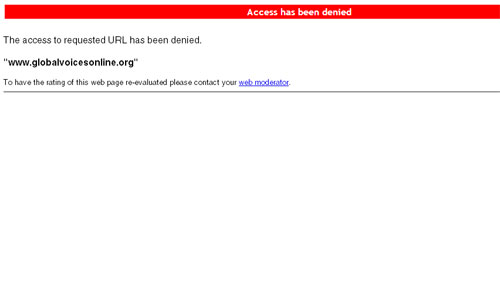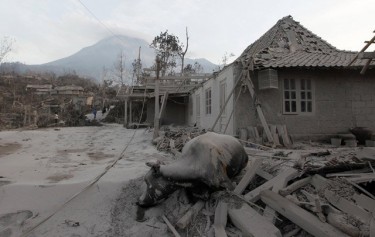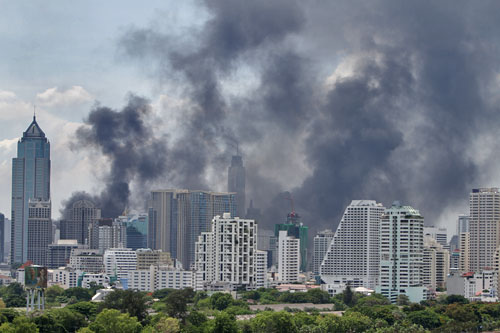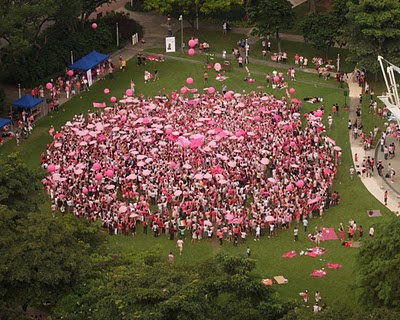The release from detention of Myanmar’s Aung San Suu Kyi and the Red Shirt protests in Thailand were probably the top political stories of 2010 as far as Southeast Asia is concerned. But there are other notable issues in the region which were featured by Global Voices. Here is our year-end report:
Social media
2010 was an election year in the Philippines and Myanmar and social media was effectively used to monitor the election results in the Philippines, and to popularize the ‘boycott elections’ campaign in Myanmar.
Through twitter, Filipinos sent ‘Merry Christmas’ greetings in September. A suicide atempt in Brunei was documented in the twitterspehere. #slashing and #369 hashtags refer to the series of slashing attacks in Singapore.
Blogs were used to promote national unity in Malaysia. Borneo Colours aggregates blogs in Borneo, the third largest island in the world. BruneiTweet is the ‘national twitter account’ of Brunei. Launched in Singapore and now operating in Indonesia, Philippines and India, sexxie.tv is an interactive sex education website. GV author Keta Haluha features some prominent Timorese on Facebook.
A video showing police brutality in East Timor was uploaded in the internet. A domestic helper from the Philippines was able to record how a Filipino labor attaché in Hong Kong treats distressed workers. A blogger named Sony from Indonesia was sued by Sony Corporation for domain name infringement. Facebookers from Thailand created a page criticizing the country’s Ministry of Culture. A father from Vietnam asked netizens to help his missing daughter.
Global Voices reported these citizen media events: Singapore Twestival, Barcamp Phnom Penh, Myanmar’s first Barcamp in Yangon, Barcamp and Educamp Saigon.
Censorship
Web and media censorship have intensified in the region. Press freedom and freedom of expression were topics which were actively written by blogger advocates in Malaysia, Singapore, and Cambodia.
Internet freedom is restricted by using various legal measures like Cambodia’s internet firewall and Thailand’s cyber scout program. Netizens are complaining that a higher number of websites and blogs, including Global Voices, continue to be inaccessible in Myanmar. Governments across the region are using the excuse of protecting the morals of the young to block the web’s ‘harmful’ content.
To improve media freedom, civil society groups pushed for the immediate passage of the Freedom of Information bill in the Philippines. Meanwhile, netizens in Indonesia rejected the “repressive” internet regulations drafted by the government.
Disaster
2010 was also a year of disasters. The most deadly was the stampede tragedy during the Water Festival in Cambodia.
Indonesia was hit by an earthquake, tsunami, and volcanic eruption in less than 48 hours. Flooding disasters struck West Papua in Indonesia, Singapore, Thailand, Vietnam, and the northern states of Malaysia. Imagine the shopping district of Singapore under floodwaters. Bangkok was also flooded for many weeks. A water shortage crisis was felt by Filipinos last July.
Singaporeans suffered the most when haze enveloped the skies of Singapore, Malaysia, and Indonesia. An oil spill also destroyed a coastal area in Singapore.
Netizens reported the impact of the earthquake last April in Sumatra, Indonesia. Citizen journalists also documented the conditions of refugees in Albay, Philippines after a volcanic eruption forced the residents to leave their homes.
Politics
As mentioned earlier, the Red Shirt protests in Thailand, which crippled the country’s capital for two months, could be the top political event in the region in 2010.
Thousands of anti-government protesters stormed the capital and formed a blockade in government buildings to demand the resignation of the Prime Minister. It was a ‘bloody’ protest as protesters splattered blood in buildings and houses of government officials. The Bangkok clashes between protesters and government troops were documented by bloggers, despite the censorship imposed by authorities.
The other politically significant event in Southeast Asia was the release from detention of Suu Kyi. This proved to be successful, at least for now, in distracting the attention of the world that it is still the junta-backed party which dominated the polls in Myanmar. By the way, Myanmar has a new flag and new name.
More than 30 years after the fall of the Khmer Rouge Regime in Cambodia, the first guilty verdict was handed out by the Khmer Rouge Tribunal The conviction of Kaing Guek Eav aka Duch for committing crimes against humanity was a globally significant news event.
Meanwhile, in Laos, the Convention on Cluster Munitions was held which highlighted the fact that Laos is the most bombed country in the world.
Obama’s homecoming speech in Indonesia inspired many Indonesians. Another speech which was vigorously discussed by netizens was the Independence Day speech of the Indonesian president.
The Malaysia-Indonesia maritime border row was one of the numerous border disputes in the region. The Philippines apologized to Hong Kong after nine HK tourists were killed in a bus hostage drama.
Wikileaks provided some interesting gossips about the politics in the region. Singapore’s Lee Kuan Yew described North Koreans as ‘psychopathic types’ ruled by a ‘flabby old chap.’ Singapore’s other senior diplomats also had some unflattering words to say about the leaders of their neighbours. As expected, Singapore dismissed the Wikileaks revelations as mere ‘cocktail talk’.
Malaysia was forced to deny that it was involved in the procurement of a missile technology from China which was intended for Iran. Leaked cables from Thailand revealed the international pressure on the Viktor Bout case. Bout is accused of being the world’s leading arms smuggler.
Wikileaks clones which sprouted in the region: Thaileaks, Indoleaks, and Pinoyleaks.
Economy
Malaysia launched its ‘new economic model’ in 2010. Bloggers reacted strongly when the Prime Minister announced the country’s 2011 budget, especially the plan to build a new mega tower.
There is a raging debate in Singapore on whether to impose a minimum wage legislation. A bank bailout in Indonesia became politically controversial. New banknotes are now in use in Laos and the Philippines, but some critics are not happy.
Sports
Football blogs in the region were featured on Global Voices. The ASEAN Football Federation Cup generated an online buzz especially during the championship game between Malaysia and Indonesia. Cambodian and Myanmar bloggers had some interesting comments about the World Cup.
Religion
Christian churches were attacked in Malaysia and Indonesia. Church leaders were also harassed. Monk morality was questioned in Cambodia. A pastor in Singapore ridiculed the teachings of Taoism and Buddhism. Bloggers reported how Muslims celebrate Ramadhan in Brunei. Thai citizens were shocked to discover more than two thousand dead fetuses in a Buddhist temple in Bangkok.
Education
Education budget cuts prompted Filipino students to stage a strike in public universities. The proposal to include sex education in the school curriculum also became a hot topic in the internet.
Malaysia implemented some education reforms like the scrapping of two examinations at the primary level; and it recently imposed a moratorim on medical schools to address the oversupply of doctors and housemen.
Gender
A political group in the Philippines proposed the legislation of a Renewable Marriage law. Child brides were reported in Malaysia.
Cambodia’s first women web portal was enthusiastically welcomed by the online community. Female entrepreneurship in Indonesia is gaining more support. Brunei bloggers raised awareness on breast cancer.
Singapore’s Pink Dot event in solidarity with the LGBT community was successfully held. Cambodian bloggers also openly discussed LGBT issues.
Three women in Malaysia were caned for having illicit sex. Some groups described the ‘dancing flight attendants’ in the Philippines as a sexist stunt.
Other GV stories
Dancing prisoners in 2007 were replaced by the Dancing Tax Collectors in 2010 in the Philippines. Durian, popular in Southeast Asia, is the King of the Fruits. Should Singapore food bloggers get free meals?
This ‘I am sorry’ video from Brunei was viewed by many people. Water buffaloes were banned in Indonesia rallies. Convicted of vandalism, a Swiss national was caned in Singapore.
Palm oil production in Malaysia is more than just an energy issue. A historic jail was demolished in Malaysia. Protests are allowed in Cambodia if they are conducted in freedom parks. Hanoi celebrated its 1,000th founding year.
In behalf of the Southeast Asia team of Global Voices, we thank all our readers for supporting us in 2010. We pledge to continue reporting the relevant and outstanding citizen media stories in the region. Happy New Year to all!











